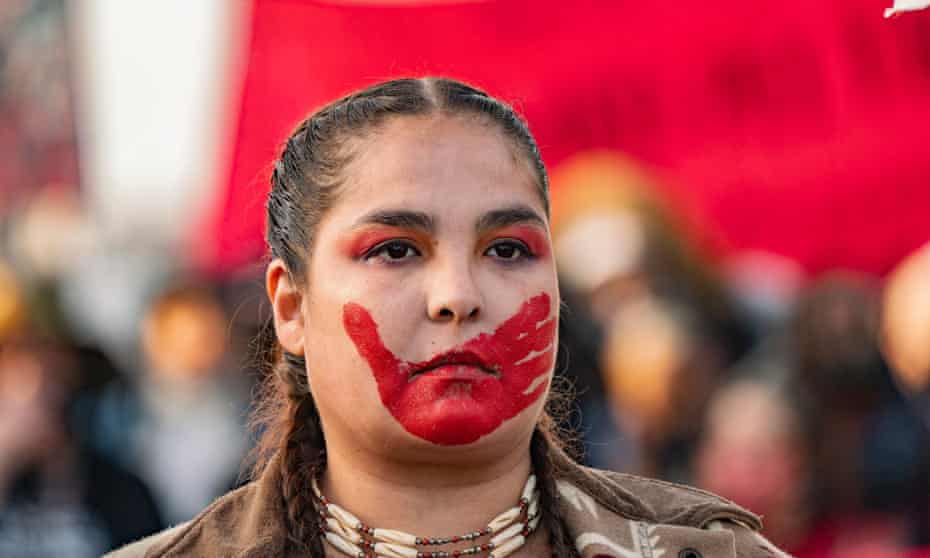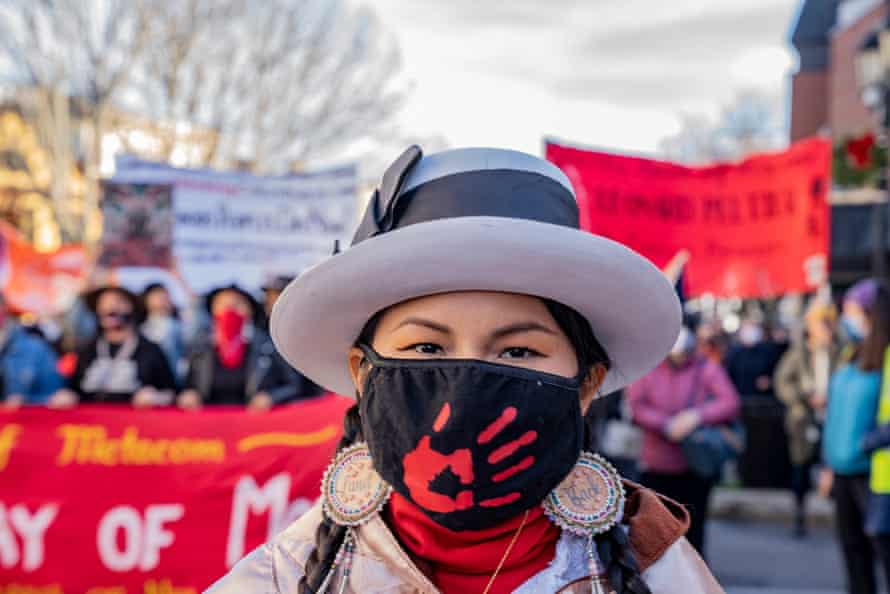“‘This alert is her scream’: new system would help locate missing Indigenous women”, The Guardian
Hallie Golden in Seattle, 18 January 2022
A program in Washington state is intended to trigger an effective search and raise awareness of the problem

Four years ago, Debra Lekanoff was busy traveling across the nation in her role as governmental affairs director for the Swinomish Tribe when her daughter came to her, worried.
The 14-year-old had just learned some of the troubling details of the crisis of missing and murdered Indigenous women and was concerned that her mother, who is Alaska Native and tended to travel alone, might one day not make it home.
Lekanoff said she remembers her daughter asking her: “Isn’t there a way where we could let everybody know when we get stolen?”
Today, as a Washington state Democratic representative and the only Native American member of the state legislature, Lekanoff is working to do just that. Earlier this month she helped introduce legislation that would implement an alert system specifically for missing Indigenous people.
If passed, the system would be a first in the US. It is expected not only to help locate the individual and improve communication between law enforcement agencies and local jurisdictions, but also to increase awareness about the crisis of missing Indigenous people, particularly women and girls.
American Indian and Alaska Native women in Washington go missing at a rate more than four times higher than the state’s white residents, according to a 2019 report by the Urban Indian Health Institute, a division of the Seattle Indian Health Board. In a 2018 report, the institute found that of the 29 states surveyed, Washington had the second highest number of cases of missing and murdered American Indian and Alaska Native women and girls.
Lekanoff, who is Tlingit and Aleut, said the system will convey to Washingtonians “that this isn’t just an Indian issue, this is really a crisis that all Washingtonians need to take responsibility for. We want to hear her screams when she’s being torn away from her family. And this alert system is her scream.”
The proposed alert system would function similarly to “silver alerts”, which are used in Washington and dozens of other states across the nation to help locate missing vulnerable people.
The idea is that when an Indigenous person is reported missing, law enforcement could activate the alert, resulting in details about the person being broadcast via highway advisory radio messages, signs and press releases for the media.
“The more this is in the dark corners of our state and that we’re not talking about [it] and we’re not sharing information, the more this crisis is going to continue,” said Washington attorney general Bob Ferguson, who worked with Lekanoff on the legislation. “I think an important step, one of many, but an important step to address the crisis, is to daylight it.”
Some tribal leaders across the state have also voiced their support for the legislation. But given the many years this crisis has gone on, there have also been questions about why such a system wasn’t implemented long ago.

“This is something that could have been enacted very quickly early on when we became of knowledge of how severe this issue was,” said Puyallup Tribal Councilwoman Anna Bean. “It’s something that we could have put in place, like a long time ago.”
But, she added: “It’s being brought to the table now, and something’s being done. And I’m just very thankful for that.”
Bean, who is also a member of the Washington State Missing and Murdered Indigenous Women and People Task Force, described the Puyallup Tribe, whose reservation lies along the US Interstate 5 corridor, as practically a “stomping ground” for trafficking and other types of crimes that results in disappearances. She said this type of alert system could make a big difference in these cases, when timely, accurate dissemination of information on a disappearance is vital.
Just a few years ago, Andy Joseph Jr, who chairs the Colville Business Council, the governing body of the Confederated Tribes of the Colville Reservation, said his own family found themselves in the middle of one of these devastating situations when the boyfriend of his daughter’s sister-in-law took their young children. The man was caught in part thanks to the community’s posts on Facebook. But Joseph said he believes the man could have been found even quicker if an alert system like the one proposed had been in place.
“I think it would make our people feel a lot safer and also I think the perpetrators might think a little bit more before they would attempt to do anything like this, because they probably know that they’d been pinned or tagged,” he said.
Some tribal officials have recommended that the alert include elements such as a photograph of the missing individual, and that the system be automated, rather than law enforcement activating the alerts, so that no one gets missed. Officials have also suggested improving data gathering on the wider crisis, so that more is understood about the issue and the impact of such an alert system.
Lekanoff said the finer details of the system would be worked out in consultation with the 29 federally recognized tribes in Washington.
She said that the proposal has received bipartisan support from lawmakers and with the legislative session kicking off last week she’s hopeful it will pass.
Lekanoff talked about the red handprint over the mouth, which has become a symbol of the missing and murdered Indigenous movement.
She said: “The alert system is removing that hand. It is unleashing the screams of those women who are being stolen or murdered from their families, from their children, from their communities.”